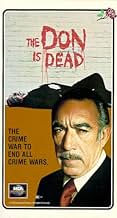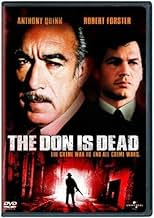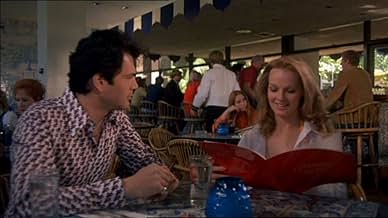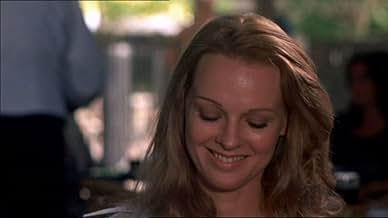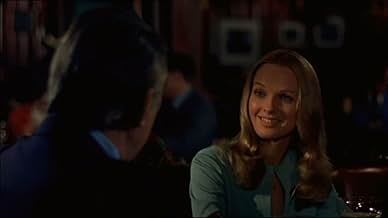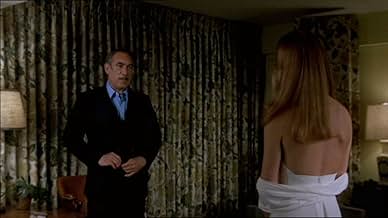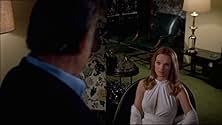VALUTAZIONE IMDb
6,2/10
1639
LA TUA VALUTAZIONE
Aggiungi una trama nella tua linguaAfter his mistress is savagely beaten up a Mafia leader goes after the killer with a bloody vengeance. Soon after the hunt begins, a gang war ensues.After his mistress is savagely beaten up a Mafia leader goes after the killer with a bloody vengeance. Soon after the hunt begins, a gang war ensues.After his mistress is savagely beaten up a Mafia leader goes after the killer with a bloody vengeance. Soon after the hunt begins, a gang war ensues.
- Regia
- Sceneggiatura
- Star
John Duke
- Don Aggimio Bernardo
- (as J. Duke Russo)
Frank DeKova
- Giunta
- (as Frank de Kova)
Recensioni in evidenza
"The Don is Dead" - the title alone is worth the price of the purchase - is too often downgraded as a quick and inferior attempt to cash in on the tremendous success of Francis Ford Coppola's "The Godfather"; released the year before. Let me tell you, the problem doesn't lie with this perfectly enjoyable and competently made Mafia saga. The problem merely is that "The Godfather" is insanely popular and too many avid fans will bash and boycott everything that even remotely resembles their preciously favorite milestone. Popular cinematic ideas are reproduced and often even get blatantly copied, that is a fact. This doesn't mean, however, that nothing good comes out of the giant stream of imitations! Italian exploitation, for example, is my personal favorite type of cinema and that genre exists for 99% out of shameless knock-offs and stolen ideas. Regardless of what you mean read, "The Don is Dead" remains an excellent drama/thriller with an absorbing plot, splendid performances from a great cast and steady direction from the underrated Richard Fleisher. Following the death of a highly respected Don, representatives of three Mafiosi clans gather to re-divide the Las Vegas territory. The slimy Luigi Orlanda and his mistress see this as an opportunity to double-cross the others and raise a destructive gang war. They manipulate for the powerful Don Angelo DiMorra to fall in love with the girlfriend of his own protégé stepson Frank Regalbuto and things rapidly escalate into deceit, executions and mass-retaliation. The story is good, and Fleisher effortlessly finds the right balance between talky sequences and exciting action footage. There are some delightful execution-highlights, like set in a barbershop or a laundry salon. Anthony Quinn gives a fine performance, although clearly modeled after Marlon Brando - I admit, and "young" actors Frederic Forrest and Robert Forster are also very impressive.
How could a movie starring Anthony Quinn, Robert Forster, Frederic Forrest, Al Lettieri, directed by Richard Fleischer and centering on cutthroat mobsters slightly miss the mark, or, not be an incredible masterpiece?
Probably because there's not much of a target to begin with, and yet, that's not such a bad thing since the breezy undertone provides a cushion of what feels like actor improvisation under the edgy, multi-plotted schemes going on... And on and on...
The story, or one of many stories, centers on a brash climber, played by Forster, who, using a somewhat contrived Brooklyn accent and not seeming as natural and genuine as usual... along with two hired guns, The Fargo Brothers played by Forrest and Letteri... are a collected trio of goons with an ambitious attempt to overthrow a newly-made don, Anthony Quinn, playing white knight to Forster's beautiful, and abused, girlfriend (cult starlet Angel Tompkins): a victim who dreams of being a famous singer.
Lightweight melodrama befitting a TV movie-of-the-week makes a lot of whistling in the cemetery - but with a catchy tune...
There are so many twists (everyone wants to kill everyone) you may need a scorecard after a while, or instructions: Although Robert Forster goes from a temperamental wild card to a downright awful bully that the audience winds up rooting against, he's much more likable than Quinn, a brooding know-it-all who, alas, is the sole DON IS DEAD hero since, well, he's Anthony Quinn...
And despite too much talk and not enough action, there are some decent gunfights between exposition and so, with all the twists and turns, pay attention and you may just follow this jigsaw puzzle that works better incomplete than when it attempts an 11th hour resolution...
What makes it fit slightly within the Noir category despite following more of a "Modern" Classic Gangster template is that the good guys and the bad are all in the mafia i.e. where there's a moral compass in a school of sharks, it's usually within a Film Noir shoreline.
Probably because there's not much of a target to begin with, and yet, that's not such a bad thing since the breezy undertone provides a cushion of what feels like actor improvisation under the edgy, multi-plotted schemes going on... And on and on...
The story, or one of many stories, centers on a brash climber, played by Forster, who, using a somewhat contrived Brooklyn accent and not seeming as natural and genuine as usual... along with two hired guns, The Fargo Brothers played by Forrest and Letteri... are a collected trio of goons with an ambitious attempt to overthrow a newly-made don, Anthony Quinn, playing white knight to Forster's beautiful, and abused, girlfriend (cult starlet Angel Tompkins): a victim who dreams of being a famous singer.
Lightweight melodrama befitting a TV movie-of-the-week makes a lot of whistling in the cemetery - but with a catchy tune...
There are so many twists (everyone wants to kill everyone) you may need a scorecard after a while, or instructions: Although Robert Forster goes from a temperamental wild card to a downright awful bully that the audience winds up rooting against, he's much more likable than Quinn, a brooding know-it-all who, alas, is the sole DON IS DEAD hero since, well, he's Anthony Quinn...
And despite too much talk and not enough action, there are some decent gunfights between exposition and so, with all the twists and turns, pay attention and you may just follow this jigsaw puzzle that works better incomplete than when it attempts an 11th hour resolution...
What makes it fit slightly within the Noir category despite following more of a "Modern" Classic Gangster template is that the good guys and the bad are all in the mafia i.e. where there's a moral compass in a school of sharks, it's usually within a Film Noir shoreline.
"The Don is Dead" wins no points for originality. Obviously, it's attempting to ride on the coat-tails of "The Godfather". And it's not a classic that deserves to be remembered years from now. Its presentation is pretty matter-of-fact and of no real distinction. But it's still very engaging visceral entertainment, at least for fanatics of the mob movie genre. It benefits from good characters, fine performances, and the kind of in-your-face violence that has become standard for this type of thing.
The prominent mafia don of Las Vegas has died, and a truce is currently existing between the three families in the city. But all of that is going to go to Hell pretty quickly, as one greedy and power-crazed individual gets the bright idea to have two of these families go to bloody war with each other - all with a simple letter addressed to Don Angelo DiMorra (Anthony Quinn). Among the leading players are ambitious young Frank (Robert Forster), the son of the deceased don, and the Fargo brothers, Tony (Frederic Forrest) and Vince (Al Lettieri).
The makers of "The Don is Dead" do cast their movie well, from top to bottom. Angel Tompkins, Charles Cioffi, Louis Zorich, Ina Balin, Joe Santos, Frank DeKova, Abe Vigoda, Victor Argo, Val Bisoglio, Sid Haig, and Vic Tayback all put in appearances. (Lettieri and Vigoda, of course, were also in "The Godfather".) Forrest is particularly effective as Tony, who would rather leave the "life" behind but gets drawn back in when things start getting ugly.
Scripted by Marvin H. Albert, from his novel, and directed by Richard Fleischer, this is compelling drama when taken on its own terms and not compared to anything else. Even if it's just on a visceral level, it *does* work.
Seven out of 10.
The prominent mafia don of Las Vegas has died, and a truce is currently existing between the three families in the city. But all of that is going to go to Hell pretty quickly, as one greedy and power-crazed individual gets the bright idea to have two of these families go to bloody war with each other - all with a simple letter addressed to Don Angelo DiMorra (Anthony Quinn). Among the leading players are ambitious young Frank (Robert Forster), the son of the deceased don, and the Fargo brothers, Tony (Frederic Forrest) and Vince (Al Lettieri).
The makers of "The Don is Dead" do cast their movie well, from top to bottom. Angel Tompkins, Charles Cioffi, Louis Zorich, Ina Balin, Joe Santos, Frank DeKova, Abe Vigoda, Victor Argo, Val Bisoglio, Sid Haig, and Vic Tayback all put in appearances. (Lettieri and Vigoda, of course, were also in "The Godfather".) Forrest is particularly effective as Tony, who would rather leave the "life" behind but gets drawn back in when things start getting ugly.
Scripted by Marvin H. Albert, from his novel, and directed by Richard Fleischer, this is compelling drama when taken on its own terms and not compared to anything else. Even if it's just on a visceral level, it *does* work.
Seven out of 10.
"The Don Is Dead" is clearly an attempt to cash in on the success of "The Godfather" which was made the previous year. Very few people regard "The Don Is Dead" as a great movie, but many admire "The Godfather" enormously. (There are also many who do not, particularly fans of gangster films in general. Their attitude was brilliantly summarised by Ian Cameron in his book "The Gangster Film" where he described "The Godfather" as "built to be the "Gone With The Wind" of the crime genre, which is to say a crime movie for people who despise crime movies but are impressed by gigantic, best selling novels, a movie for people who do not even much like movies.")
"The Don Is Dead" borrows from "The Godfather" the central theme of a younger, less forceful, less impressive brother maturing during a crisis and developing both leadership qualities and murderous ruthlessness. It also borrows the carefully explained structure of the crime family with its leader (the Don) and its adviser. Fortunately, "The Don Is Dead" takes nothing else from "The Godfather". It does not aspire to be a "Gone With The Wind" of gangster movies. It is content to be an enjoyable, fast-moving well-made crime film. "The Don Is Dead" was made by a team of top Hollywood professionals, and their expertise is evident throughout.
In a city dominated by three crime families, the adviser of one hatches a scheme to grab control of the city by setting the other crime families against each other. For a time his plan works well, and gang warfare breaks out. One of the family heads is dependant on two brothers who kill for him. The younger of these brothers is reluctant to participate but is more intelligent than both his brother and his friend, the crime Don. Gradually, as the violence accelerates, the younger brother assumes command.
The pacing of "The Don Is Dead" is excellent. Each scene is tightly cut but nothing is rushed. Whether an action scene or a whispered conversation, everything is given as much time as necessary but nothing more. The shootings and bombings - of which there are many - are done properly: in other words quickly but credibly. Neither John Woo-style ludicrously fast cutting nor Sam Packinpah-type slow motion diminish "The Don Is Dead".
With one exception, the acting is good throughout. It was enjoyable to see Anthony Quinn in a modern role and wearing smart city clothes. Quinn, of course, has enormous power on screen, but so too have some of the actors in supporting roles. The exception is Frederic Forrest who has neither the acting skill nor the screen charisma adequately to flesh out the main role of the younger brother. He is further hampered by his whining voice. Throughout he gives the impression of being weak and petulant. A key scene is when he returns to his base which has been bombed in his absence and learns that his brother has been killed. His men are about to quit. After a moment or two of private grief, he shouts at his men that they will strike back, and restores their self-confidence and determination. Actors like Charlton Heston and George C. Scott could have worked miracles with that material, but Frederic Forrest just stands there and whines. It is difficult to imagine any hardened criminal regarding him as a leader.
The cinematography is excellent, and Richard H. Kline deserves congratulation for creating in a colour movie the chiaroscuros traditionally found in black and white crime films of the 1940s. Jerry Goldsmith provides an atmospheric, low-key score which consistently increases the tension. During his career Richard Fleischer never received due credit for being a brilliant director, probably for the same reason that Michael Curtiz, John Huston and Robert Wise did not: he was versatile and made a wide variety of movies instead of working with the same subject matter again and again. In his staging and pacing of scenes, his handling of the actors - with that one exception - his placement of the camera and in the high quality work he elicited from his crew, Fleischer demonstrates in "The Don Is Dead" that he was a master film director.
"The Don Is Dead" is probably not a film for every-one, but any-one who likes a good gangster movie should make a point of seeing it.
"The Don Is Dead" borrows from "The Godfather" the central theme of a younger, less forceful, less impressive brother maturing during a crisis and developing both leadership qualities and murderous ruthlessness. It also borrows the carefully explained structure of the crime family with its leader (the Don) and its adviser. Fortunately, "The Don Is Dead" takes nothing else from "The Godfather". It does not aspire to be a "Gone With The Wind" of gangster movies. It is content to be an enjoyable, fast-moving well-made crime film. "The Don Is Dead" was made by a team of top Hollywood professionals, and their expertise is evident throughout.
In a city dominated by three crime families, the adviser of one hatches a scheme to grab control of the city by setting the other crime families against each other. For a time his plan works well, and gang warfare breaks out. One of the family heads is dependant on two brothers who kill for him. The younger of these brothers is reluctant to participate but is more intelligent than both his brother and his friend, the crime Don. Gradually, as the violence accelerates, the younger brother assumes command.
The pacing of "The Don Is Dead" is excellent. Each scene is tightly cut but nothing is rushed. Whether an action scene or a whispered conversation, everything is given as much time as necessary but nothing more. The shootings and bombings - of which there are many - are done properly: in other words quickly but credibly. Neither John Woo-style ludicrously fast cutting nor Sam Packinpah-type slow motion diminish "The Don Is Dead".
With one exception, the acting is good throughout. It was enjoyable to see Anthony Quinn in a modern role and wearing smart city clothes. Quinn, of course, has enormous power on screen, but so too have some of the actors in supporting roles. The exception is Frederic Forrest who has neither the acting skill nor the screen charisma adequately to flesh out the main role of the younger brother. He is further hampered by his whining voice. Throughout he gives the impression of being weak and petulant. A key scene is when he returns to his base which has been bombed in his absence and learns that his brother has been killed. His men are about to quit. After a moment or two of private grief, he shouts at his men that they will strike back, and restores their self-confidence and determination. Actors like Charlton Heston and George C. Scott could have worked miracles with that material, but Frederic Forrest just stands there and whines. It is difficult to imagine any hardened criminal regarding him as a leader.
The cinematography is excellent, and Richard H. Kline deserves congratulation for creating in a colour movie the chiaroscuros traditionally found in black and white crime films of the 1940s. Jerry Goldsmith provides an atmospheric, low-key score which consistently increases the tension. During his career Richard Fleischer never received due credit for being a brilliant director, probably for the same reason that Michael Curtiz, John Huston and Robert Wise did not: he was versatile and made a wide variety of movies instead of working with the same subject matter again and again. In his staging and pacing of scenes, his handling of the actors - with that one exception - his placement of the camera and in the high quality work he elicited from his crew, Fleischer demonstrates in "The Don Is Dead" that he was a master film director.
"The Don Is Dead" is probably not a film for every-one, but any-one who likes a good gangster movie should make a point of seeing it.
And also very faithful to Marvin Albert's work. I read it six times in my life, the first one when I was 16. This is of course influenced by GODFATHER, borrowing a couple of the actors of Corleone saga. This story could easily have given a mini series, because you have focus on many sub characters and plots. But the book was not that huge either. I I have always enjoyed this Dick Fleischer's feature. And watch out for the faces here. As were THE UNTOUCHABLES. The good thing here is that you have not real lead character, mainly supporting ones, or the one you may think the lead is actually not the winner at all.... As in the Marvin Albert's novel.
Lo sapevi?
- QuizActors Abe Vigoda and Al Lettieri had recently appeared in Francis Ford Coppola's Il padrino (1972).
- ConnessioniReferenced in Triplo gioco (1993)
I più visti
Accedi per valutare e creare un elenco di titoli salvati per ottenere consigli personalizzati
- How long is The Don Is Dead?Powered by Alexa
Dettagli
- Tempo di esecuzione
- 1h 55min(115 min)
- Proporzioni
- 1.85 : 1
Contribuisci a questa pagina
Suggerisci una modifica o aggiungi i contenuti mancanti

